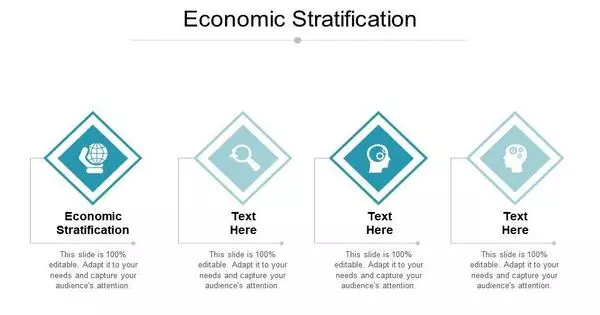Economic stratification is the circumstance in which social classes are segregated or stratified along economic lines within a society. It is a term often connected with the study of social and economic inequality within a certain community or country. Different economic divisions or levels are plainly visible. While individual members of any society will have variable degrees of wealth, economic stratification often refers to the condition in which there are considerable differences in the wealth owned by diverse groups, with rare exceptions in transitional regions.
Economic stratification can have serious consequences for social mobility, resource availability, and overall well-being. It is not to be confused with the closely related idea of economic inequality. This is concerned with the distribution of wealth rather than the existence of separate strata. Economic inequality and economic stratification can, of course, coexist.
Key points about economic stratification include:
- Income Inequality: Income inequality is frequently caused by economic stratification, with some persons or groups earning much more than others. Income disparities can be caused by variations in education, work prospects, access to resources, and other variables.
- Wealth Distribution: Economic stratification includes disparities in wealth distribution. Property, investments, and savings are examples of assets. Some individuals or families may amass great fortune, but others may struggle to accumulate any major financial reserves.
- Social Classes: Within an economically stratified society, people are typically classified into different social classes based on their economic status. Common class divisions include lower class, working class, middle class, and upper class, each with distinct economic characteristics and lifestyle patterns.
- Access to Opportunities: It can impact access to a variety of opportunities, including education, healthcare, and job chances. People from lower socioeconomic strata may confront impediments to adequate education or healthcare, restricting their opportunities for social mobility.
- Poverty and Wealth Concentration: It can result in concentrated poverty in some locations, where marginalised populations face limited access to basic necessities. Wealth concentration, on the other hand, might result in a tiny fraction of the population having a disproportionate amount of the nation’s wealth.
Economic stratification can have far-reaching consequences for society, such as possible tensions, social unrest, and political ramifications. Large differences in wealth and income can cause social unrest and widen the chasm between different groups of society.
Economic stratification is frequently studied by governments, policymakers, and social scientists to better understand its causes, implications, and potential policy interventions to minimise inequities and promote more equitable economic growth. To reduce economic inequities and build a more inclusive society, several policies such as progressive taxation, social welfare programmes, and targeted education efforts are frequently proposed.
















